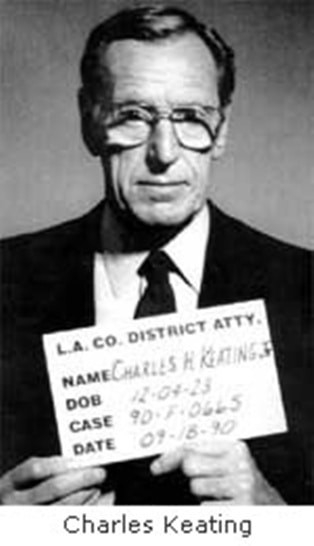Perhaps you heard on the news yesterday that Charles Keating is now dead, having roamed the Earth for 90 years. I thought I’d take this opportunity to share a snippet from my Panic, Prosperity, and Progress book, which features a chapter on the S&L crisis in which Keating was so prominently featured. I think memories of Keating are absolutely charming, because it helps us remember a day long ago when financial criminals went to prison – – at least for a while. Of course, Lloyd Blankfein, Jamie Dimon, Ben Bernanke, Steve Cohen, and all the rest of them are cheerfully roaming free, wallowing in ill-gotten cash…………so welcome to the modern age! Anyway, here’s a tidbit:
Because the depositors were executing this transfer within the confines of a Federally-insured bank, many of them falsely assumed that the bonds would likewise be safe from failure. Many of these depositors were elderly and uninformed about the risk they were taking, and in the end, the bonds would be rendered worthless. FDIC Chairman William Seidman would later state that this switch was “one of the most heartless and cruel frauds in modern memory.”
Keating even tried his hand at foreign currency trading to create speculative trading profits,  but he instead managed to lose $11 million more in the firm’s money in a single month. The cash crunch at the bank was getting worse, and in spite of Keating’s attempts at influence-peddling, regulators were not backing down anymore.
but he instead managed to lose $11 million more in the firm’s money in a single month. The cash crunch at the bank was getting worse, and in spite of Keating’s attempts at influence-peddling, regulators were not backing down anymore.
In April, 1989, American Continental Corporation declared bankruptcy, and Lincoln Savings was placed in receivership by the Federal Home Loan Bank Board. Incredibly, a full 23,000 depositors had been convinced to put their savings into American Continental bonds, which were not federally insured, and newspapers were rife with tales of senior citizens who life savings had been damaged or wiped out altogether. One widely-circulated photo showed an elderly woman angrily confronting Keating in a courtroom. The bondholders saw nearly three hundred million dollars vanish.
American taxpayers would be on the hook for $3.4 billion to cover losses for Lincoln depositors. Keating had spent $50 million of the firm’s money just fighting regulators, but in the end, the day of reckoning for Lincoln arrived. Not that he was ashamed of his attempts to buy off Senators: in April 1989, Keating told reporters, “One question, among many raised in recent weeks, had to do with whether my financial support in any way influenced several political figures to take up my cause. I want to say in the most forceful way I can: I certainly hope so.”
The criminal charges and lawsuits began piling up swiftly. In September 1989, Keating was subjected to a $1.1 billion fraud and racketeering suit from the Federal government. He was brought in front of Congress in November to answer questions, but he pled the Fifth Amendment to each question.
California charged Keating with 42 different counts in September 1990, and he was convicted in December 1991 of fraud, racketeering, and conspiracy. He was sentenced in April 1992 by Judge Lance Ito (who would become nationally famous for residing over the O.J. Simpson trial several years later) to ten years in a maximum-security prison.
This sentence was augmented in January 1993 by a federal conviction based on 73 different counts of fraud, conspiracy, and racketeering. In July 1993, Keating was sentenced to 12 ½ years in a federal penitentiary. He was further ordered to pay $122 million in restitution to the government. The Resolution Trust Corporation also received a summary judgment in the amount of $4.3 billion against Keating, which was the largest judgment against an individual in history.
Keating took on the role of a victim, declaring himself a “political prisoner” of the United States and stating that if the regulators had never gotten involved, all the investors in his organization would “be rich.”
In spite of the mountain of convictions against him, Keating’s luck changed in his favor in 1996 as the famously-liberal 9th U.S. Circuit Court of Appeals in San Francisco overturned multiple convictions. In the end, there were no felonies on Keating’s record, and he was a free man after serving only 4 ½ years in prison.

